German politicians call for eased Covid restrictions amid rising infection rates

In light of the increasing availability of vaccines, German politicians are calling for Covid restrictions to be eased further - despite the fact that infections have been rising steadily since Tuesday.
"If everyone has received a complete vaccination offer and the vaccination protects against severe courses of Covid, including newer variants, we must gradually take our corona measures back," said Saarland's Prime Minister Tobias Hans (CDU) told Welt am Sonntag.
In an interview with the same paper, CSU General Secretary Markus Blume and the head of the Hamburg CDU, Christoph Ploß, also argued that restrictions should be eased as vaccination coverage increases.
"As soon as every citizen has received a complete vaccination offer and the vaccination protection remains effective, the overall responsibility passes from the state back to the individual citizen," said Blume. "That means: if everyone is protected by vaccination, the period of restrictions for everyone ends. But we're not there yet."
Those who have been immunised against Covid are likely to reject future restrictions if everyone who wants a vaccine has had one, Ploß added.
"For those who are fully vaccinated, the restrictions must fall then at the very latest," he said.
Foreign Minister Heiko Maas (SPD) recently spoke out in favour of lifting all corona restrictions as soon as all people in Germany have received a vaccination offer. Maas expects this to happen sometime in August.
READ ALSO: German Foreign Minister joins calls to relax Covid rules for vaccinated people
As of Sunday, 58.2 percent of the German population had been given at least one dose of vaccine, while 42.1 percent were fully immunised.
Infection rates continue to rise
The 7-day incidence of Covid infections increased for the fifth day in a row on Sunday, but remains in single digits.
According to the Robert Koch Institute (RKI), the 7-day incidence was 6.2 on Sunday, compared with 5.8 on Saturday, and 5.0 a week ago.
Meanwhile, the health authorities reported 745 new corona infections to the RKI within one day, compared to 559 infections a week ago. Six new coronavirus-related deaths were registered within 24 hours.
READ ALSO: Germany’s infection rate rises slightly as new Covid variant reaches Europe
In other European countries, however, the spike in infections in recent weeks has been much more dramatic.
In Spain, for example, the 7-day incidence of Covid infections more than doubled between July 2nd and 9th - soaring from 92 to 201.
The acceleration in infections has been so striking that on Friday, RKI announced that the whole of the country would be placed on its list of risk areas.
This means that, from Sunday, the German government is advising against tourist trips to the Germans' favourite holiday destination.
Since Spain is only classed as a risk area for now, though, there are very few practical consequences for holidaymakers - aside from having to register on the German entry portal on their return.
READ ALSO: Germany declares whole of Spain a Covid ‘risk area’
Does vaccination make the 7-day incidence redundant?
German politicians are still debating whether the progress of the vaccination drive means that rising infection rates have become a less relevant measure of the impact of Covid.
"The more people are vaccinated and tested, the more the incidence value alone loses its informative value," said Saarland Prime Minister Hans.

Saarland Prime Minister Tobias Hans (CDU) believes that the 7-day incidence will become less relevant as Covid vaccinations increase. Photo: picture alliance/dpa | Michael Kappeler
For this reason, many believe that the focus should be more on intensive care bed occupancy in hospitals in autumn.
The Social Democratic Party (SDP) argued in a statement on Saturday that the incidence would no longer be a sufficient indicator for the damage done by Covid after the successful vaccination campaign.
READ ALSO: Car parks, job centres and festivals: How Germany is trying to get Covid jabs to everyone
Meanwhile, the pro-business Free Democratic Party (FDP) has asked the federal government to present a timeline for the removal of restrictions by the end of the parliamentary summer break.
Otherwise the complex patchwork of Covid-related regulations could continue indefinitely in each of the German states, they claimed.
'Wait at least three months'
Hesse's Prime Minister Volker Bouffier (CDU) remained more cautious in the Welt am Sonntag.
“First we should wait at least three months, because then we will know better what effects the Delta variant and the return of holidaymakers from abroad will have,” he said.
A continuation of the requirement to wear masks could be needed to mitigate against the effects of more relaxed social restrictions, Bouffier explained.
Speaking to the Bild am Sonntag, Bundestag President Wolfgang Schäuble called on people to continue to be vigilant, even if restrictions have been relaxed.
"I've observed with great concern what is going on in the Wembley football stadium or in some holiday resorts," Schäuble said.
Anyone who behaves unreasonably and does not take precautionary measures exposes everyone to the danger of a fourth wave, he said.
"Therefore: dear people, be pleased that we can go out to eat again, meet people, but don't overdo it," warned the Speaker of Parliament.
Comments
See Also
"If everyone has received a complete vaccination offer and the vaccination protects against severe courses of Covid, including newer variants, we must gradually take our corona measures back," said Saarland's Prime Minister Tobias Hans (CDU) told Welt am Sonntag.
In an interview with the same paper, CSU General Secretary Markus Blume and the head of the Hamburg CDU, Christoph Ploß, also argued that restrictions should be eased as vaccination coverage increases.
"As soon as every citizen has received a complete vaccination offer and the vaccination protection remains effective, the overall responsibility passes from the state back to the individual citizen," said Blume. "That means: if everyone is protected by vaccination, the period of restrictions for everyone ends. But we're not there yet."
Those who have been immunised against Covid are likely to reject future restrictions if everyone who wants a vaccine has had one, Ploß added.
"For those who are fully vaccinated, the restrictions must fall then at the very latest," he said.
Foreign Minister Heiko Maas (SPD) recently spoke out in favour of lifting all corona restrictions as soon as all people in Germany have received a vaccination offer. Maas expects this to happen sometime in August.
READ ALSO: German Foreign Minister joins calls to relax Covid rules for vaccinated people
As of Sunday, 58.2 percent of the German population had been given at least one dose of vaccine, while 42.1 percent were fully immunised.
Infection rates continue to rise
The 7-day incidence of Covid infections increased for the fifth day in a row on Sunday, but remains in single digits.
According to the Robert Koch Institute (RKI), the 7-day incidence was 6.2 on Sunday, compared with 5.8 on Saturday, and 5.0 a week ago.
Meanwhile, the health authorities reported 745 new corona infections to the RKI within one day, compared to 559 infections a week ago. Six new coronavirus-related deaths were registered within 24 hours.
READ ALSO: Germany’s infection rate rises slightly as new Covid variant reaches Europe
In other European countries, however, the spike in infections in recent weeks has been much more dramatic.
In Spain, for example, the 7-day incidence of Covid infections more than doubled between July 2nd and 9th - soaring from 92 to 201.
The acceleration in infections has been so striking that on Friday, RKI announced that the whole of the country would be placed on its list of risk areas.
This means that, from Sunday, the German government is advising against tourist trips to the Germans' favourite holiday destination.
Since Spain is only classed as a risk area for now, though, there are very few practical consequences for holidaymakers - aside from having to register on the German entry portal on their return.
READ ALSO: Germany declares whole of Spain a Covid ‘risk area’
Does vaccination make the 7-day incidence redundant?
German politicians are still debating whether the progress of the vaccination drive means that rising infection rates have become a less relevant measure of the impact of Covid.
"The more people are vaccinated and tested, the more the incidence value alone loses its informative value," said Saarland Prime Minister Hans.

Saarland Prime Minister Tobias Hans (CDU) believes that the 7-day incidence will become less relevant as Covid vaccinations increase. Photo: picture alliance/dpa | Michael Kappeler
For this reason, many believe that the focus should be more on intensive care bed occupancy in hospitals in autumn.
The Social Democratic Party (SDP) argued in a statement on Saturday that the incidence would no longer be a sufficient indicator for the damage done by Covid after the successful vaccination campaign.
READ ALSO: Car parks, job centres and festivals: How Germany is trying to get Covid jabs to everyone
Meanwhile, the pro-business Free Democratic Party (FDP) has asked the federal government to present a timeline for the removal of restrictions by the end of the parliamentary summer break.
Otherwise the complex patchwork of Covid-related regulations could continue indefinitely in each of the German states, they claimed.
'Wait at least three months'
Hesse's Prime Minister Volker Bouffier (CDU) remained more cautious in the Welt am Sonntag.
“First we should wait at least three months, because then we will know better what effects the Delta variant and the return of holidaymakers from abroad will have,” he said.
A continuation of the requirement to wear masks could be needed to mitigate against the effects of more relaxed social restrictions, Bouffier explained.
Speaking to the Bild am Sonntag, Bundestag President Wolfgang Schäuble called on people to continue to be vigilant, even if restrictions have been relaxed.
"I've observed with great concern what is going on in the Wembley football stadium or in some holiday resorts," Schäuble said.
Anyone who behaves unreasonably and does not take precautionary measures exposes everyone to the danger of a fourth wave, he said.
"Therefore: dear people, be pleased that we can go out to eat again, meet people, but don't overdo it," warned the Speaker of Parliament.
Join the conversation in our comments section below. Share your own views and experience and if you have a question or suggestion for our journalists then email us at [email protected].
Please keep comments civil, constructive and on topic – and make sure to read our terms of use before getting involved.
Please log in here to leave a comment.